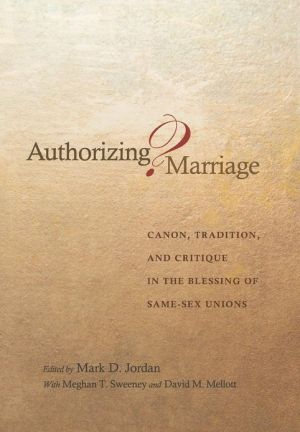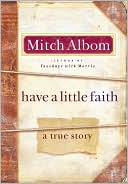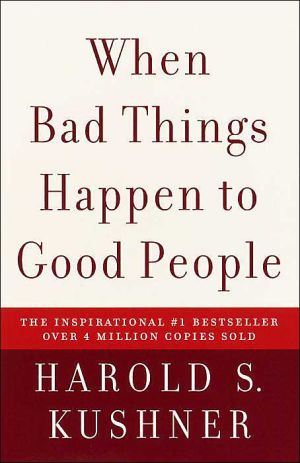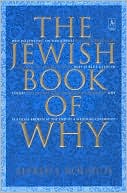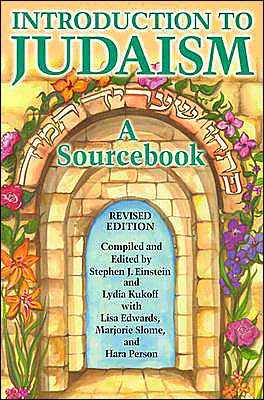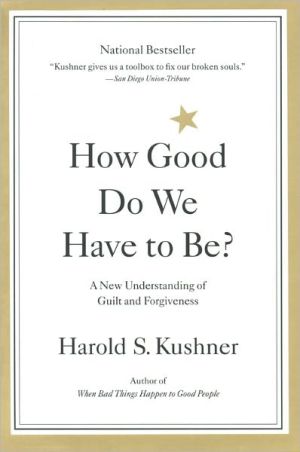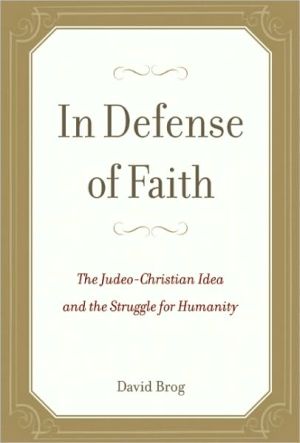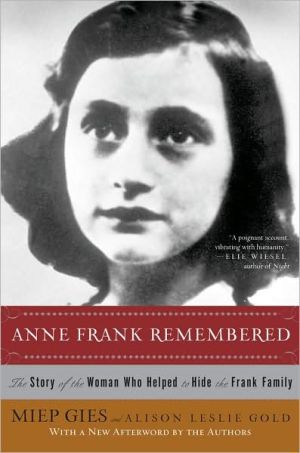Authorizing Marriage?: Canon, Tradition, and Critique in the Blessing of Same-Sex Unions
The opponents of legal recognition for same-sex marriage frequently appeal to a "Judeo-Christian" tradition. But does it make any sense to speak of that tradition as a single teaching on marriage? Are there elements in Jewish and Christian traditions that actually authorize religious and civil recognition of same-sex couples? And are contemporary heterosexual marriages well supported by those traditions?\ As evidenced by the ten provocative essays assembled and edited by Mark D. Jordan, the...
Search in google:
"Brilliant, fascinating and persuasive. This book will stir significant debate."--David Balch, Texas Christian University"A convenient sampling of views and interpretations that raises the level of discourse on this controversial public issue. A useful and thoughtful piece of work."--Rachel Adler, Hebrew Union College, Jewish Institute of Religion William Countryman - Church Times Learned and absorbing essays. . . . Some of the best historical and theological writing I have read in a long time is contained within the covers of this book. If those on the right wing in our current conflicts fail to enter into serious and thoughtful conversation with these and other recent offerings, they will be convicting themselves of irrational partisanship and intellectual obscurantism.
Authorizing Marriage? Canon, Tradition, and Critique in the Blessing of Same-Sex Unions\ \ Princeton University Press\ Copyright © 2006 Princeton University Press\ All right reserved.\ ISBN: 0-691-12346-2 \ \ \ Introduction\ Mark D. Jordan \ American Political debates over same-sex unions are punctuated by appeals to a "Judeo-Christian tradition of marriage." When the appeals are rejected, it is often with an argument about the separation of church and state-as if the only error in them were the application of religious reasoning to the legislation of a pluralistic democracy. The appeals ought to be much more generally troubling, because they reduce complex Jewish and Christian traditions to mere slogans. The slogans presuppose any number of confusions and reductions. They conflate Jewish with Christian, of course, even though the two groups of religious teachings and practices, diverse in themselves, typically differ in their assumptions about marriage or their prescriptions for it. (To see the mistake in claiming that the "Judeo-Christian tradition" has always prohibited marriage except between one man and one woman, it is enough to read the Book of Genesis.) The appeals further presume that "marriage" was essentially the same over the disparate cultures and several millennia traversed by the two religious traditions. They make it seem, finally, if only in their self-assurance, that all Jewish or Christian reasoning about family or sanctifyingsexual desire must come down against same-sex unions. The essays in this volume show that religious traditions are more complicated-and more provocative.\ For this volume, the authors were asked to consider some hard questions: Do the canonical scriptures of Judaism and Christianity offer any justification for blessing same-sex unions, whether as marriages or as some other form of erotic union? Could such justification be found in traditions of scriptural interpretation, religious law, or liturgical practice? If not, can contemporary exegesis or theological critique legitimately construct justifications for offering those blessings to couples of the same sex?\ Their responses to these questions took different forms. The arrangement of essays here represents only one way of grouping them. The first three papers are concerned with biblical interpretation. Saul M. Olyan reviews passages from the Hebrew Bible that often figure in debates over same-sex desire, but he is most interested by a phrase in David's famous lament over Jonathan that suggests a homoerotic and possibly sexual relationship between them. Dale B. Martin considers a larger number of passages throughout the New Testament that make a strong case against marriage of any kind. Mary Ann Tolbert concurs with Martin, adding alternative readings and additional passages, but her main concern is to argue that the canonical texts offer an ideal of friendship that contemporary same-sex couples can find affirming and helpful.\ The next group of essays takes up categories and principles from Greek philosophy that resonate with both Jewish and Christian thinkers at various times. The two essays converge on Plato's Symposium. In a revision of his earlier views, Daniel Boyarin argues from Diotima's speech not only that Platonic love has nothing to do with physical touch, but that it is much closer than might be imagined to some versions of Rabbinic Judaism. In dialogue with Aristophanes' speech, Laurence Paul Hemming undoes the simplistic binary logic deployed in so many condemnations of same-sex coupling that invoke other-sex "complementarity."\ The next two essays are concerned not so much with marriage as with weddings-with the liturgical rites that inaugurate and sometimes define a marriage. Steven Greenberg rehearses the historical function of the elements in a traditional Jewish wedding and then suggests how they might be revised or replaced in a liturgy for same-sex couples. I take up the best cases for the historical existence of rites for same-sex pairs-of lovers, of friends-in order to analyze the fallacies in the search for liturgical precedents. In different ways, Greenberg and I have one eye on history and another on the ambiguities of contemporary practice.\ The volume concludes with three essays that provide theological assessments of the contemporary debates. In a deft retrieval of Richard Hooker, Kathryn Tanner argues that "conservative" Episcopalian opposition to same-sex love is in fact a new Puritanism that undoes principles of Anglican polity. Susan Frank Parsons points beyond opposition to homoeroticism from natural law or purpose to a theology of a created relationship called into the future. Placing himself squarely between critics of marriage and critics of same-sex desire, Eugene F. Rogers Jr. argues that same-sex couples should be blessed in order to recognize that they are means of sanctification for those called to be within them.\ These brief descriptions are meant not to summarize the essays but to show one way in which they fit together to make a whole. After reading them, you will see how many other patterns they make-and how silly it is to reduce any of them to a single point or position. For example, the essays cannot be sorted simply as between exegesis of sacred texts and modern revision or reconstruction. The most constructive essays refer to scriptural passages, and the most exegetical attend to questions of contemporary application. The authors are all accomplished textualists of one sort or another and none of them advocate throwing over traditional texts in some fantasy of pure invention or utopian revolution. Nor do the essays divide neatly as between historians and theologians. In this volume, there is no tidy contrast between an inert past and a lively present-or between a sacred past and a decadent present.\ What may be more interesting, the essays do not fall out along religious or denominational lines. Certainly some essays concentrate on the Hebrew scriptures, rabbinic interpretation, and contemporary Jewish liturgy and others interpret the New Testament, Christian theologians, and the rites of Christian communities, but the conclusions they draw are not, to my eye, deeply opposed or even significantly segregated along that line. There are no predictable denominational divisions among Protestant, Anglican, and Roman Catholic authors. Unexpected agreements can be found in the experience of many ecumenical and interreligious groups in recent decades. Here they may suggest how quickly debates over same-sex unions cross all the old lines.\ Nor can the essays be neatly classed as "left" or "right," "liberal" or "conservative." Some readers will no doubt judge the conclusions or sympathies of the majority of contributors as appallingly "liberal," but then they will immediately have to concede that the term liberal is no longer meaningfully opposed to conservative. Many of the essays that argue in favor of "liberal" conclusions about same-sex unions do so with arguments in the classic manner from scripture and tradition. They are seriously engaged with interpreting and applying religious traditions. If they are not immediately labeled "conservative," that is because the label now has less to do with conserving traditions than with agreeing to a certain list of answers, some of which may be quite alien to tradition.\ The contributions do agree, on my reading, in resisting reductions. They insist that authoritative texts, and especially canonical texts, should never be simplified according to the taste of one or another contemporary polemic. This resolution entails resisting conceptual or philosophic reductions built into the frames within which texts about anything sexual are now interpreted. The belief that sex supremely determines the character of human persons or their relations is hardly the invention of same-sex advocates. It is a much more general feature of American discourse. It motivates both proposals for blessing same-sex unions and defenses of heterosexual marriage. It appears as much in the latest versions of sexual liberation as in the (highly untraditional) assumption that heterosexual Christian marriage ought to guarantee a certain minimum of sexual satisfaction, even experimentation. American "muscular Christianity" of the nineteenth century seems to have been succeeded by a hygienic-therapeutic Christianity in the late twentieth, according to which sexual pleasure is the right of every Christian couple-though not of their children.\ The contributors also agree, on my reading, in multiplying conceptions of sex and gender-or of sex, sexuality, and gender-or of whatever overly neat scheme one tries to impose. The conceptions sometimes turn to obvious and yet easily suppressed links, as between misogyny and the angry rejection of same-sex love. Traditions that restrict or formerly restricted the participation of women are also traditions that severely repress same-sex desire, at least between men. The same point could be made by noting that almost every traditional condemnation of same-sex desire carries with it a derogatory reference to women.\ Resistance to reduction is also evident when the essays deal with the possibilities for liturgical innovation and the loud demands to refuse any. The memory for liturgy in many religious groups is notoriously short. If some textual or symbolic elements of the rites do quote much older ceremonies, the whole of even the most traditional rite is often framed, performed, or understood with quite contemporary sensibilities. The same might be said of arguments over liturgical change. It is often noted that the quarrels over the smallest detail of liturgy can quickly become ferocious, even (or especially) when the detail in question is of rather recent origin. The same reaction is frequent enough in that unruly mixture of religious, familial, communal, economic, and reproductive considerations that surrounds most marriage rites. Those attending many Jewish or Christian weddings would be astonished to learn the origin or early significance of many of the central liturgical elements-and yet many resist changing what they learned (often without understanding) as children.\ The essays that follow range widely, but they hardly cover every topic or vantage point on Jewish and Christian marriage. Some topics were excluded by the original questions posed to the contributors. The emphasis on constructive engagement with the traditions' authorities did not particularly invite sociological or anthropological studies-though one may notice how those issues play at the border of some of the essays here. The original emphasis also did not solicit strategic plans for changing the official policies of religious groups or rewriting current legislation (in those groups that distinguish legislation or canon law from theological and liturgical traditions). Nor will the essays here be recognized immediately as pastoral (to use the Christian metaphor), if pastoral refers to a fairly narrow range of practical guidelines. In another and more traditional sense, all of the essays are eminently practical and pastoral because they treat urgent questions of contemporary religious living. Nor, finally, do the essays pretend to treat the authorities of the hundreds of religious traditions not mentioned by them, including some important varieties of modern Judaism and Christianity.\ Some readers may feel a more important exclusion. They will conclude that some important voices are missing-voices representing ethnic, racial, national, and class identities or sexual roles beyond lesbian and gay. Will it be any consolation to say that strenuous efforts were made to invite a diverse group of contributors? Some of those invited declined because of the usual hazards of individual obligations. Others who should have been invited may have been missed through the limits of acquaintance. But it should also be admitted that not all the limitations were individual. To state the obvious: Some groups are significantly underrepresented in academic circles, and therefore the few scholars who have established themselves are inundated by invitations. What is just as important for this volume, the number of scholars willing to write about same-sex issues varies tremendously from one religious group to another. It is much easier-much safer-to speak publicly about same-sex unions in Reconstructionist Judaism or liberal Protestantism than in Roman Catholicism or Orthodox Judaism, especially if one holds a religious office. It is safer to speak about these issues as a Jew or a Christian than as an adherent of some other religions-or so the responses to invitations would suggest.\ Polemicists often speak as if the world were swarming with "liberal" scholars in every field ready to take up the least detail of queer life with uninhibited explicitness. This is simply not true. The triumph of queer studies has been greatly exaggerated even in most secular fields. Outside a few famous departments, scholars working on homosexual topics often find themselves battling to teach courses or secure students-and to keep their jobs. The situation is more perilous in religion or religious studies than in many other fields. To be able to write affirmatively about same-sex topics in religion, one has to be employed either in a secular school (where the study of religion is often suspect) or in one of the dwindling number of "liberal" seminaries or religious institutions. Even for those who have such happy appointments, the pressures that can be brought to bear are often formidable. Several contributors to this volume have had to consider carefully what they could say in print without costing themselves or their home institutions much trouble. Anticipations of consequences have weighed so heavily on some potential contributors that they decided they could not participate. No one should judge their decision who has not been subject to such pressures.\ The missing voices would weigh more heavily if this volume pretended to be representative. It does not. Indeed, it does not pretend to be complete in any way. Its aim is much more modest. The essays collected here mean to show at least two things. The first is that the question of recognizing or blessing same-sex unions is much more complicated as a religious question than is typically admitted in public debate. This is because-the second point-religious marriage itself is much more complicated than most debaters want to admit. The two points are important enough to be worth demonstrating. They are demonstrated here quite fully, if from a necessarily limited selection of evidence. It is particularly important to demonstrate them because they seem to be forgotten week after week, year in and year out, no matter how many other topics advance and retreat through the public debates.\ The essays that follow say much more beyond these two points. They offer startling readings of scripture. They uncover the philosophical questions underneath the apparently solid floor of religious debate. The essays disconcert assumptions about the fixity of gender or the importance of sex. They make something so familiar as this weekend's wedding ceremonies appear suddenly alien. The one thing they refuse to do is to pretend to answer all the important religious questions about same-sex unions.\ (Continues...)\ \ \ \ \ Excerpted from Authorizing Marriage? Canon, Tradition, and Critique in the Blessing of Same-Sex Unions Copyright © 2006 by Princeton University Press. Excerpted by permission.\ All rights reserved. No part of this excerpt may be reproduced or reprinted without permission in writing from the publisher.\ Excerpts are provided by Dial-A-Book Inc. solely for the personal use of visitors to this web site. \ \
"Surpassing the love of women" : another look at 2 Samuel 1:26 and the relationship of David and Jonathan7Familiar idolatry and the Christian case against marriage17Marriage and friendship in the Christian New Testament : ancient resources for contemporary same-sex unions41Why is Rabbi Yohanan a woman? : or, a queer marriage gone bad : "platonic love" in the Talmud52Can I really count on you?68Contemplating a Jewish ritual of same-sex union : an inquiry into the meanings of marriage81Arguing liturgical genealogies, or, the ghosts of weddings past102Hooker and the new Puritans121Ad Imaginem Dei : is there a moral here?139Trinity, marriage, and homosexuality151
\ Scottish Journal of TheologyThis collection makes a refreshing change from the familiar ping-pong battle between liberals and conservatives about the ownership of the Judae-Christian tradition on sex and marriage. . . . This is an impressive collection of powerful imaginative projects. It may not 'solve' any problems. But it certainly opens windows of opportunity for fresh reflection among the stereotypes.\ — George Newlands\ \ \ \ \ Church Times - William Countryman\ Learned and absorbing essays. . . . Some of the best historical and theological writing I have read in a long time is contained within the covers of this book. If those on the right wing in our current conflicts fail to enter into serious and thoughtful conversation with these and other recent offerings, they will be convicting themselves of irrational partisanship and intellectual obscurantism.\ \ \ Sexuality Research & Social PolicyA series of provocative and surprising essays that take up the warrant for blessing same-sex unions from a variety of Judeo-Christian perspectives. . . . Taken as a whole, the volume provides some unusual and provocative arguments from a variety of religious perspectives that supporters of same-sex marriage might take into account as they formulate their strategies for future public debates.\ \ \ \ \ Scottish Journal of TheologyThis collection makes a refreshing change from the familiar ping-pong battle between liberals and conservatives about the ownership of the Judae-Christian tradition on sex and marriage. . . . This is an impressive collection of powerful imaginative projects. It may not 'solve' any problems. But it certainly opens windows of opportunity for fresh reflection among the stereotypes.\ \ \ \ \ Church TimesLearned and absorbing essays. . . . Some of the best historical and theological writing I have read in a long time is contained within the covers of this book. If those on the right wing in our current conflicts fail to enter into serious and thoughtful conversation with these and other recent offerings, they will be convicting themselves of irrational partisanship and intellectual obscurantism.\ — William Countryman\ \ \ \ \ Sexuality Research & Social PolicyA series of provocative and surprising essays that take up the warrant for blessing same-sex unions from a variety of Judeo-Christian perspectives. . . . Taken as a whole, the volume provides some unusual and provocative arguments from a variety of religious perspectives that supporters of same-sex marriage might take into account as they formulate their strategies for future public debates.\ — Rebecca Alpert\ \
